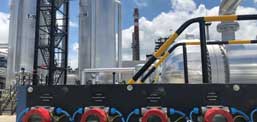
Oil and gas corporation, MOL Group, has invested in a new, US$10 million rubber bitumen plant at its Zalaegerszeg site in western Hungary. The plant has an annual capacity for 20,000 tonnes of rubber bitumen – the raw material for road construction is enough to construct a standard 200km highway or to refurbish the upper layer of 600km of a highway.
Rubber bitumen roads have become increasingly widespread due to the excellent adhesion and a higher load capacity of the rubber bitumen. It is hoped to improve road conditions in the long run, as these properties lowers the likelihood of potholes or ruts forming. Around residential areas, rubber bitumen roads can be used to achieve significantly lower levels of traffic noise and reduce environmental noise pollution.
“In the last eight years, about 150km of road sections have been built or refurbished in Hungary using rubber bitumen, which can now increase in volume due to the newly added production capacity,” said Tibor Zsinkó, Vice President, MOL Hungary Downstream. “The production of 20,000 tonnes covers about 10-15% of the domestic bitumen demand and is sufficient to meet the demand for bitumen for larger volumes of road construction works. What is more, this amount also provides the possibility to exploit new business opportunities in surrounding countries.”
MOL Group is aiming to establish itself as the market leader for recycling in Central and Eastern Europe – the completion of the Zala rubber bitumen plant is another building block on the way to deliver on the company’s “Enter Tomorrow 2030” strategy, Zsinkó added.
